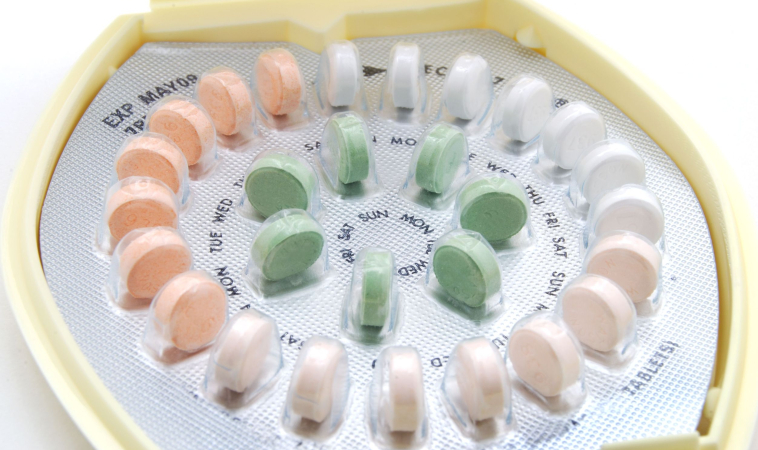Dr. Sarah King, ND
@sarahhealthyfox
California’s new laws regarding the availability of birth control is a huge win for supporting women’s autonomy over reproductive health. Any woman can now easily gain access to hormonal birth control by visiting a pharmacy in California, but this decision is much more complicated than we’re led to believe. There are things every woman should know when deciding if using hormonal birth control is right for them.
Available as different combinations of low-dose estrogens and progesterone (progestin) “the pill” is often the first choice for women who are trying to prevent pregnancy as it’s non-invasive and doesn’t disrupt sexual practices. Additionally, hormonal contraceptives are used as a first-line treatment for menstrual symptoms such as heavy bleeding, breakthrough bleeding, painful periods (dysmenorrhea) and acne. Medical doctors will even go as far to advise if you are ever going on a beach vacation, you can continue taking the pill and postpone your period for a week or longer.
Think about that: The pill gives you the power to control when you get your period. It seems a little unnatural playing around with synthetic hormones and deciding when it’s convenient for your uterine lining to shed. Regardless, it’s common for women to continue taking the pill for three packs (9 weeks) in a row to reduce the number of periods they experience per year. This “protocol” is available on the market as its own brand of contraception and it very well may be warranted in certain situations; It’s often used in peri-menopausal women to assist in the transition of their naturally changing hormone levels. However, women need to know that they have the option of using other methods and interventions to shift their natural hormone cycles. There are pros and cons to each one depending on her unique situation.
Hormones for a Healthy Menstrual Cycle
Hormonal therapy overrides a woman’s endogenous hormones instead of altering and regulating her natural cycle. It’s not uncommon for a woman to notice that her previous menstrual issues come back after stopping hormonal contraceptives. But hormones in general are not static; They respond to our bodies, to our environment and to themselves! The way in which a woman’s cycle presents for a few months isn’t her life-long prognosis. Adjusting diet and lifestyle factors or using alternative treatments may be needed to experience a healthy cycle.
There are many non-pharmaceutical treatment options for cycle regulation, pre-menstrual and menstrual symptoms. Naturopathic doctors have many different tools for helping women achieve their best and happiest periods. I’ve had great success using acupuncture to treat many menstrual dysregulations. From heavy bleeding, irregular bleeding, and especially dysmenorrhea, acupuncture can regulate cycles and reduce monthly cramping and pain.
There are several botanical preparations that also work in regulating cycles, one of which is Chaste Tree (Vitex agnus-castus). As a progesterone modulator it doesn’t act as a hormone itself but helps to support normal hormone levels. It can be used to regulate cycles, treat dysmenorrhea, reduce acne, and relieve PMS (especially irritation and bloating). As well, it can be used to support women coming off of hormonal contraceptives and to re-balance normal hormone levels after replacement therapy. It’s not uncommon for women to have irregular cycles again once discontinuing hormone replacement, and naturopathic medicine is a fantastic source for getting your body back on track again.
Hormones for preventing pregnancy
For other women, menstrual cycles may or may not be normal but the goal is to prevent pregnancy. Using hormonal therapy primarily as contraception can be very efficacious if used properly. This means taking the pill at the same time every day and not skipping days/doses. Any variation or change in the hormones administered can lead to a rapid response. Missed days or doses can cause breakthrough bleeding in addition to increasing the risk of pregnancy up to 9%1.
With so many different combinations available, finding the right hormonal combination is important and can take time. One factor that deters women from the pill are the side effects. Some women have great luck with the first combination they try, experiencing zero side effects and maybe even have an enjoyable period. However, there is always the possibility of having an adverse reaction and needing to try different combinations and/or brands to find the one that works best with your body. Pay attention to your mood, your energy, and your body as a whole. If you don’t feel right, this type of hormone replacement might not be right for you.
All that said, you may still want to use hormonal contraceptives, and the wonderful part of this discussion, and about the new regulations in California, is that it’s your choice. The decision to start any type of medication or hormone replacement should not be taken lightly and we need to understand that there are pros and cons to each therapy. Here is some additional information to help in your decision-making:
- Failure Rates: Hormonal contraceptives have a 0.3% failure rate if used perfectly, but a 9% failure rate with typical use1. On average, the chance of getting pregnant after having unprotected sex is 33%. As a comparison, condoms when used perfectly have a failure rate of 2%, but with typical use the failure rate to prevent pregnancy is 18% 1. Diligent cycle-tracking/ “natural” methods for preventing pregnancy have a 0.4-5% failure rate if cycles are consistent, normal, and if tracking is done perfectly1. If not adhered to precisely the risk of pregnancy increases to 24%.
- It can take months to get your regular period again after you stop the pill. It’s not uncommon for it to take up to six months for your natural period to come back. If you’re looking to stop hormonal contraceptives in order to achieve pregnancy, plan ahead and allow enough time for your cycles to regulate normally.
- If you plan on having children at some point, consider not taking hormonal contraceptives long-term, or have your risk of pre-mature ovarian aging assessed before starting. Hormonal contraceptives can significantly lower your Anti-Müllerian Hormone (AMH) which is a measure of your ovarian reserve. During long-term use of the pill about 10% of women will quietly develop premature ovarian senescence2. This means they will stop taking the pill and find they are experiencing menstrual abnormalities or struggle with infertility.
- Hormonal birth control depletes vitamins B2, B6 and B12. These vitamins have so many functions in your body including energy production, red blood cell production, immune function, metabolism, and production of neurotransmitters like serotonin and dopamine. A deficiency in any of these vitamins can cause fatigue, PMS, mood swings, depression and insomnia3.
- The pill protects you against ovarian cancer, but can increase your risk of breast and cervical cancer.For women under the age of 35, breast cancer risk increases from 2 in 1000 to 6 in 10001.
- It increases your risk for blood clots and stroke. Women who are smokers should not use hormonal birth control1.
The reality of women having more control over their bodies is absolutely wonderful. A lot of responsibility comes with having a uterus: cycle tracking, trying to maintain sanity through hormonal shifts, managing any symptoms before or during menstruation, being aware of bleeding, and always being conscious of pregnancy. Whether trying to prevent pregnancy, monitoring for it, or planning for the future, it’s common for women to be continuously conscious of their own uterine “status”. Sometimes it’s nice having the pressure off and using a hormonal replacement can definitely help.
The complexity of women and our biology is amazing, though we are still very much individuals, we all share a similar “reproductive window” in time. Women only have from puberty to peri-menopause (often starting in early 40’s) to figure out if they want to have children and to produce those children. Cycle regulation takes time as does transitioning between synthetic and natural endogenous hormones. Therefore, it’s necessary to have these discussions to investigate the goals you are trying to achieve for your body and health. Utilizing naturopathic medicine is fantastic way to help support your body, either naturally or in conjunction with hormonal therapies.
 Dr. Sarah King is a licensed Naturopathic Doctor, graduating from the Canadian College of Naturopathic Medicine in 2014. Prior to completing her medical studies, she attended Nipissing University where she received her Honors Bachelor of Science in Biology. Sarah has a passion for women’s health and is a birth doula in Durham and Toronto Region. She treats a wide variety of health conditions including menstrual disorders and hormone balancing, fertility, prenatal care, digestive concerns, skincare and mental health/anxiety. Outside the office Sarah is an avid runner with a love of the GTA’s best forest trails. She also continues to improve her yoga practice and teaches breath work as part of stress management counselling to her patients.
Dr. Sarah King is a licensed Naturopathic Doctor, graduating from the Canadian College of Naturopathic Medicine in 2014. Prior to completing her medical studies, she attended Nipissing University where she received her Honors Bachelor of Science in Biology. Sarah has a passion for women’s health and is a birth doula in Durham and Toronto Region. She treats a wide variety of health conditions including menstrual disorders and hormone balancing, fertility, prenatal care, digestive concerns, skincare and mental health/anxiety. Outside the office Sarah is an avid runner with a love of the GTA’s best forest trails. She also continues to improve her yoga practice and teaches breath work as part of stress management counselling to her patients.
References:
- Compendium of Therapeutic Choices, CTC 7. 7th ed. Ottawa: Canadian Pharmacists Association, 2014.
- Kushnir, V. A., Barad, D.H., and Gleicher, N. “Ovarian Reserve Screening before Contraception?” Reproductive BioMedicine Online (2014) 29(5): 527-29
- Gaby, Alan. Nutritional Medicine. Concord, N.H: Fritz Perlberg, 2011.
















